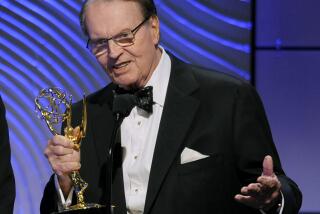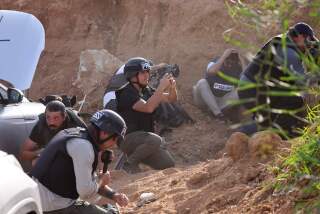CBS Newsman Charles Collingwood Dies
Charles Collingwood, a Beau Brummell among war correspondents, whom Edward R. Murrow hired as a youngster and launched into a brilliant broadcasting career that spanned four decades of war, peace and war again, died Thursday of cancer.
A CBS spokeswoman announced in Los Angeles that Collingwood was 68 and died in Lenox Hill Hospital in New York City. He had undergone surgery for colon cancer last December, and doctors then said his chances for recovery were good.
The often-honored Collingwood, whom colleague Dan Rather recalled in a newscast Thursday night as a “classic correspondent when the job had an aura of romance and daring,” was a young reporter for United Press in London, where he had attended Oxford University on a Rhodes Scholarship.
He had joined UP’s London bureau in 1939. Two years later, Murrow placed him amid what many media critics believe was the most innovative and creative news team ever to bring war from battleground to living room.
Collingwood joined Murrow in broadcasts from London, but by November, 1942, he had moved to North Africa and covered the joint British-American landing at North Africa under then Lt. Gen. Dwight D. Eisenhower.
He landed with American troops on Omaha Beach in June, 1944, and followed them through their devastation of Germany. He also was heard on radio a year later, recording the end of man’s bloodiest war.
He remembered it as a war “we all believed in because we were fighting something evil. Somehow it seemed that when they signed those (armistice) papers, a cloud lifted from the world and we all thought there would be a better, more prosperous, more peaceful world opening up for us.”
There wasn’t, and in the decades that followed World War II Collingwood again found himself amid battling soldiers, this time in Indochina. He helped birth the infant television, crossing the world for the Soviet occupation of Prague, the Six-Day War in the Middle East, the funeral of Sir Winston Churchill and a new set of talks about yet another armistice--in Paris over Vietnam.
He had been CBS News’ first United Nations correspondent and was the first network newsman to visit North Vietnam, in 1968. He stayed on the go overseas but returned to the United States in 1975 and became reporter and anchorman for special CBS radio and TV projects. But then he was sent to Tehran when the hostages were seized in 1979 and to Cairo when Anwar Sadat was assassinated in 1981.
For two years (1959-61) he succeeded his mentor when Murrow left his popular “Person to Person” television interview show and later joined John F. Kennedy’s Administration.
Debonair yet low-key, he lived and married well. His first wife, the vivacious blonde actress Louise Allbritton, died in 1979. His second marriage was to concert singer Tatiana Anjelini Jolim.
‘Could Wear Spats’
It was Collingwood, whom Rather memorialized Thursday night as a man “who could wear spats without embarrassment,” who guided America through Jacqueline Kennedy’s White House in a 1963 TV look into presidential closets. And it was Collingwood who appeared last year with an elite panel of aging war correspondents to recall the 40th anniversary of the invasion of Europe and to castigate the Reagan Administration for keeping the media from another invasion--this one in Grenada.
Like Walter Cronkite, Collingwood was forced to retire when he turned 65 because of network policy. In lieu of a watch, they gave him a videotape of highlights of his career, narrated by Rather.
“In the office he was sometimes called ‘The Duke of Collingwood,’ ” Rather said after learning of his friend’s death. “When he lived in London, his plumber came over from France. If a news organization is like a big unruly family--and in a lot of ways it is--then Charles Collingwood was everyone’s favorite uncle.”
More to Read
The complete guide to home viewing
Get Screen Gab for everything about the TV shows and streaming movies everyone’s talking about.
You may occasionally receive promotional content from the Los Angeles Times.






